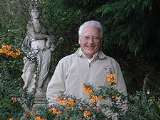
James Lovelock
Dr James Ephraim Lovelock CH, CBE, FRS (born July 26, 1919) is a British independent scientist, author, researcher, environmentalist and futurologist. He is most famous for proposing and popularizing the Gaia hypothesis, in which he postulates that the Earth functions as a kind of superorganism (a term coined by Lynn Margulis).
Gaia: A new look at life on Earth
- The climate and the chemical properties of the Earth now and throughout its history seem always to have been optimal for life. For this to have happened by chance is as unlikely as to survive unscathed a drive blindfold through rush hour traffic.
- In the current fashionable denigration of technology, it is easy to forget that nuclear fission is a natural process. If something as intricate as life can assemble by accident, we need not marvel at the fission reactor, a relatively simple contraption, doing likewise.
- Our planet...consists largely of lumps of fall-out from a star-sized hydrogen bomb...Within our bodies, no less than three million atoms rendered unstable in that event still erupt every minute, releasing a tiny fraction of the energy stored from that fierce fire of long ago.
- We have since defined Gaia as a complex entity involving the Earth's biosphere, atmosphere, oceans, and soil; the totality constituting a feedback or cybernetic system which seeks an optimal physical and chemical environment for life on this planet.
